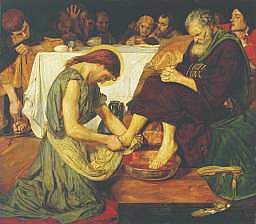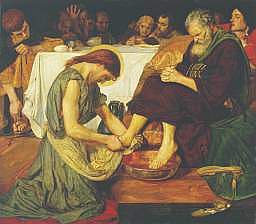Michael did particularly well in the Internet boom. He and Linda bought a large home as a result of that success. But that home was never just theirs alone; that home belonged to their church—and to anyone else who wanted to drop by. And there was always someone dropping by.
My wife and I had the pleasure of hanging out at Michael and Linda's place. We witnessed some baptisms in their pool, ate several dinners there, and I weekly practiced our worship music in their basement.  When they learned we would be moving away, Michael and Linda sent us off by taking their time to make us Cincinnati-style chili from scratch. Nice touch.
When they learned we would be moving away, Michael and Linda sent us off by taking their time to make us Cincinnati-style chili from scratch. Nice touch.
Michael and Linda are the epitome of hospitality. Their home is open to anyone because they understand that God has a heart for sojourners and those who need a place to lay their heads. Michael and Linda are our inspiration.
It doesn't take a protracted examination of our American society to see that we have fostered a culture of desert islands upon which a family here and a single there and an elderly couple over there float in the same social ocean, but have virtually no real contact. With civilization itself based on a foundation of strong social ties, we seem to be heading for a collapse of that civilization if we do not restore the broken-down relational machinery God built into us.
Last year, as I was trying to understand the whole Emergent thing, I picked up a book by Joe Myers called A Search to Belong. This book was getting great press within Emergent ranks, so I read it and promptly felt my stomach sink. One particular passage flat-out made me seethe. Myers insisted that it was too much for some people to enter another person's home and that we should not expect people to want to do this.
Now I'm no expert on sociology, but the bigger question has to be, What happened to hospitality that we've bred people who suffer fits of anxiety should they have to come to someone else's house?
Church, what happened to hospitality?
Do we no longer practice it because
- It takes too much time?
- We have too many expensive things in our homes that can break?
- It costs too much money to be hospitable?
- We have no physical energy reserves that we can use to make others feel connected?
- We don't like our space being invaded by others?
- People, in general, give us a rash?
- We're too busy shoring up our own nuclear family?
I wonder if the problem stems from this passage:
Above all, keep loving one another earnestly, since love covers a multitude of sins. Show hospitality to one another without grumbling.
—1 Peter 4:8-9 ESV
Maybe we are trapped in that sinful no man's land where if we did practice hospitality, we'd grumble about it—grumbling's a sin, right? Better to not grumble by not having anything to do with hospitality and then everything's okay. Who can say?
I remember my parents entertaining people at our family home all the time. They went to other people's houses all the time. But as I look around, I get the discouraging sense that this idea is passing away with that generation. I hope that isn't the case, but it's what I see.
You would hope that the Church would do a better job of this, but I find that hospitality is as commonly practiced by people who don't know the Lord as those who do. I'm just as likely to hear of someone who acts like the devil's compadre but who lets his buddies crash at his place as much as I hear that Christians welcome even their own kind into their homes.
And what is the point of having greeters at a Church? They have greeters at Wal-Mart, but that doesn't make me feel loved by Sam Walton's megacorporation. Sure, it feels nice to have someone shake your hand, but if it goes no further than that, what's the point? Too often the onus is on people visiting a church to reach out to the church members rather than it being the other way around. Shouldn't we be the ones to note the visitors—or in our own fractured relational world within our churches can we not tell the regulars from the visitors? And if you consider Myer's comment, if folks get a nervous tic thinking about going into someone else's home, what does it mean for them to go into their church—and then have to be the one who makes small talk?
Even before we met Michael and Linda, my wife and I decided that we would be the ones who sought to bring people together and show others hospitality. We've tried very hard at this, but the results have been middling. As much as we want to be hospitable, we sometimes wonder if people want to receive that hospitality. Perhaps Joe Myers is right. We may have reached a place where being in another's home is too much of a freak-out for too many people. Maybe the failure of people to practice hospitality has spawned a generation unable to not only practice it, but receive it as well.
But we will not stop being hospitable.
As for our churches, we should identify the people who are blessed with the gift of hospitality and underwrite them. Huh, you say? Well, what if we designated church funds for use by the most hospitable people in our churches to locate the new people every Sunday, then offer to take them out to a local restaurant for lunch after the meeting? The church could pick up the visitor's tab. Those same hospitable people could have visitors over to their own home later (regardless of what Myers says.) Wouldn't that be more effective to reaching out to others than what we are doing now? If the Church is not overflowing with the grace that pours out through hospitality, then where will people see it practiced?
What if the hospitality of early Christians was one of the very things that set them off from the people around them, the practice of hospitality being the very aroma of heaven to the lost and perishing?
Do we really believe this verse?
Do not neglect to show hospitality to strangers, for thereby some have entertained angels unawares.
—Hebrews 13:2 ESV
Or don't we? How many individual and corporate blessings have we missed because we failed to be hospitable in our homes and churches?
Remember, we are awaiting a heavenly dinner party called "The Marriage Supper of the Lamb." If we're not emulating that idea this side of heaven, will we appreciate that Supper when we finally sit down for it?
Some things you can do to practice hospitality:
At home
- Pray that God would fill you with love for other people and with hospitality
- Let other people know you have an open home
- Let your children know that you have an open home
- Invite all your neighbors over for a backyard BBQ
- Periodically invite one neighbor family over to your house for a 1:1 time
- Invite people from your church over who would not get invited elsewhere
- If you are worried about a dirty house, pay a responsible young person in the neighborhood or your church to help you clean before and after get-togethers
- Host church events at your home
- Take a cooking or entertaining class
- Teach a cooking or entertaining class in your home
- Cook for neighbors and church members when they are sick or overwhelmed
- Remember that you need no reason to have people over
At church
- Pray that God would fill your church with love for other people and with hospitality
- Identify the most welcoming and hospitable people in your church and work with them to develop that gift
- When visitors come:
-
- Make certain your hospitality folks identify them and offer to sit with them
- Offer to take them out to lunch—on the church's tab—after the service
- Don't put the onus on visitors to identify themselves, but put that on the hospitality team to identify visitors
- Hospitality team should offer to have them over for a home cooked meal (pastors should consider this also!)
If we worked harder at this little thing, I believe we would go a long way to strengthening families, couples, singles, churches, and neighborhoods for the Lord.


 This is in response to a couple comments in my
This is in response to a couple comments in my  The perpetually moving target that is the method of some to capture the exact mode of meeting of the first century Church is bothersome. Methodology is great and I applaud those who are going for as pure a methodology as can be understood, but at some point we just need to get on with doing what the Lord commanded: making disciples. If every couple years we rip down the idea of what constitutes a “true” church meeting, then we are only forcing our churches through ever-finer strainers. Who or what comes out of that in one piece is debatable.
The perpetually moving target that is the method of some to capture the exact mode of meeting of the first century Church is bothersome. Methodology is great and I applaud those who are going for as pure a methodology as can be understood, but at some point we just need to get on with doing what the Lord commanded: making disciples. If every couple years we rip down the idea of what constitutes a “true” church meeting, then we are only forcing our churches through ever-finer strainers. Who or what comes out of that in one piece is debatable.